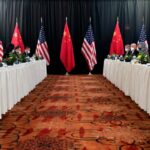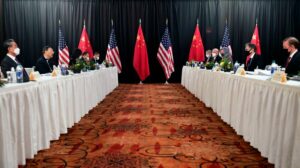The West’s Greatest Folly

 The new US president Joe Biden recently announced his intention to convene a “Summit for Democracy” with the aim of reuniting the West—this time, above all against China. The European Commission, for its part, already classified China as a “systemic rival” in 2019. These moves represent active efforts to re-establish the fundamental liberal anti-communist consensus as the West’s common creed. This anti-communism constitutes the core of the West’s hubris, as was recently so sharply criticized by Antje Vollmer in the pages of the Berliner Zeitung.
The new US president Joe Biden recently announced his intention to convene a “Summit for Democracy” with the aim of reuniting the West—this time, above all against China. The European Commission, for its part, already classified China as a “systemic rival” in 2019. These moves represent active efforts to re-establish the fundamental liberal anti-communist consensus as the West’s common creed. This anti-communism constitutes the core of the West’s hubris, as was recently so sharply criticized by Antje Vollmer in the pages of the Berliner Zeitung.
Let us begin by looking back on history. It was anti-communism that served as legitimization for the German bourgeoisie to throw itself into Hitler’s arms. Anti-communism was also cited as the pretext to abandon the Spanish Republic to Franco’s alliance with German and Italian fascism, while the “democracies” stood by and watched the slaughter and Stalin turned on and butchered left-wing forces in Spain. Soon thereafter, it was anti-communism that prevented a French and British alliance with the Soviet Union to prevent the German invasion of Poland before that ill-fated date of 23 August 1939.
Anti-communism could not prevent the establishment of a Bolshevik dictatorship and the Red Terror in the Civil War of 1918–22 led by Lenin and Trotsky. Nor could it stop so-called “collectivization” and the Great Terror of the Stalinist regime to which many millions of people fell victim, despite the fact that the terror Stalinism unleashed provided anti-communism with illustrative material and threatened to completely destroy the European Left. After all, by equating socialism with Stalinism, all left-wing politics were subjected to the suspicion of totalitarianism.
While anti-communism failed to prevent the crimes committed in the name of Communism, it instead made possible the great crimes of Nazism and fascism as well as World War II by preventing the West from engaging in timely resistance to Hitler. As a result of the war, Hitler’s Germany, with its policy of exterminating Jewry and Communism and enslaving the Slavic peoples, was defeated, but a whole series of states of East-Central and Southeast Europe came under the control of the Soviet Union for 40 years.
Thomas Mann, who went into exile as early as February 1933, described the fear of communism in a speech in Washington in October 1943 as “one of the greatest follies of our epoch”—a folly extending all the way back to the nineteenth century. He expressed little more than a fact when he stated that “in the eyes of Western conservative capitalism, fascism was simply the bulwark against Bolshevism and against everything which was understood by the word”. It was the “frightening word by means of which Hitler made his conquests”.
Mann’s epochal experience had been that when freedom does not ally itself with equality, it prepares the ground for the enemies of freedom. This complements another—no less significant—epochal experience emerging from the legacy of Bolshevism and Stalinism: namely, that equality in turn is not sustainable without freedom, as it otherwise leads to injustice and stagnation. The Soviet Union proved to be a historical dead end, as finally became evident in 1989–91. A socialism that truly seeks to overcome capitalism must preserve and develop the viability of communism as well as liberalism.
Repeating the Same Mistake?
In 1989–90, the West missed the great opportunity to build a “common European home” as called for by Mikhail Gorbachev, to initiate an ecological transition in time (what the Club of Rome called the “first global revolution”), and to launch an active peace policy. Instead, the “Westernization of the world” was pursued in the name of anti-communism. Efforts were immediately made to create a new “American century” via means of new wars, systematic destabilization of states, and a policy of continuous marketization and global competition.
The final results are appalling. In ecological terms, 30 years have been wasted. The US has spent 7 trillion dollars (!) on the wars in Iraq and Afghanistan alone. There are more refugees than at any time in the last 70 years. The capacity for global cooperation, as the pandemic shows, has shrunken to almost nil. Meanwhile, the US and what purports to be the “free West” are confronted with a global challenger the likes of which was never seen in the twentieth century—the People’s Republic of China.
Once again, anti-communism is being used to stage a new Cold War. China is viewed as a systemic rival that should be denied access to technology and hampered in its access to markets. The goal is military containment and encirclement. China is accused of having no respect for human rights, allowing no democratic participation for its population, and denying freedom to its citizens. Yet these are the same Chinese citizens who, before the pandemic, met us in their millions as tourists in Rome, Paris, or Berlin, only to elatedly disappear back home into their alleged national “prison”—a prison that Western tourists in China, for their part, experience as a haven of growing prosperity and liberal lifestyles. Meanwhile, China’s success in fighting poverty is historically unprecedented.
Anti-communism is used to construct an extreme opposition between the differences of the “West” and China’s political, economic, and cultural system (and that of other states): an “Us” versus a “Them”, an opposition between “democracy” and “autocracy”, between “freedom” and “unfreedom”, “right” and “wrong”. Raising reasonable doubts about figures published in the West concerning the extent of political repression in China or Russia is treated as complicity in their crimes. The freedom to form one’s own opinion thus becomes impossible. In the name of anti-communism, a fundamentalist conformism is being enforced in a way that is no longer subtle but brutal, according to the motto of “Whoever is not for us is against us!” Such anti-communism is itself totalitarian.
One should also be allowed to think about the unspeakable: Abraham Lincoln once described democracy as government “of the people, by the people”, and “for the people”. If one compares the political systems of the United States, Brazil, India, and the People’s Republic of China, it must be possible to ask whether the system in which a single party has been in charge for decades does not also have important democratic characteristics, in that it works for the people and encourages their participation in “non-Western” ways. And, conversely, to ask whether governments that emerge from free elections cannot also be oligarchic and authoritarian or act against their own people.
But what is even worse: the real dangers facing humanity and the free life of people now and in the future lie in the foreseeable climate catastrophe, in the continued destruction of states that turns many millions into refugees, in global and domestic social division, in the uncontrolled accumulation of financial assets, the crisis of which can then drag the global economy into ruin as in the late 1920s, and in the rise of fascist regimes. These dangers lie in the build-up of military confrontation. The omen posed by the mob on the steps of the US Capitol, the “citadel of freedom”, should not be forgotten.
Criticism, of course, is warranted—criticism of anti-social policies in Germany as well as of the (in)justice system in the US, which puts millions of black people in prison, criticism of the restriction of political freedoms in China or the environmental destruction being unleashed in Brazil. The list is long. But all this cannot and must not be a reason to turn it into another fundamentalist Cold War in the name of anti-communism. The attempt to start this war alone is criminal. It is foolish, as Thomas Mann said, to follow blindly those who commit such a crime.
Another German poet, Gotthold Ephraim Lessing, referred to the ring parable in his tragedy Nathan the Wise: a father hands over to each of his three sons a ring that supposedly gives its wearer the power to be pleasing to God and fellow men. Yet only one of the three rings was expected to have this power. Since none of the sons knew which was the “true” ring, from now on there was only one way to prove it—by their own exemplary actions. If competition between states has to be, then not in the destructive form of fighting against each other, but in cooperation for the best and fastest contribution to preventing the climate catastrophe and stopping ecological destruction, to eliminating global poverty, to reducing military tensions, to expanding the real possibilities of each and every person and of all peoples for a self-determined life in security and dignity.